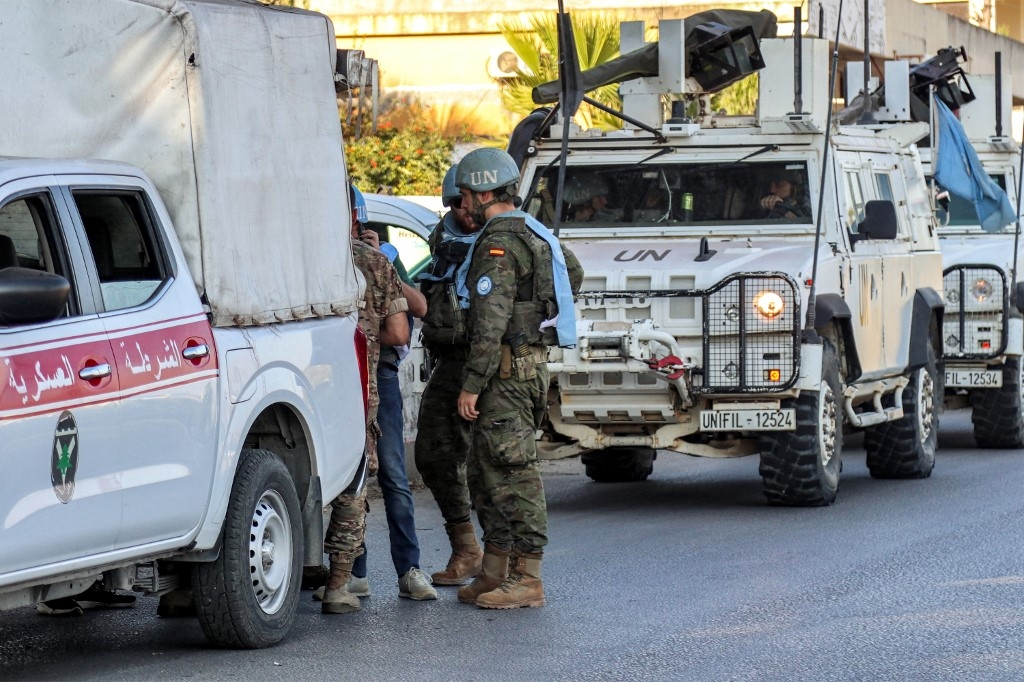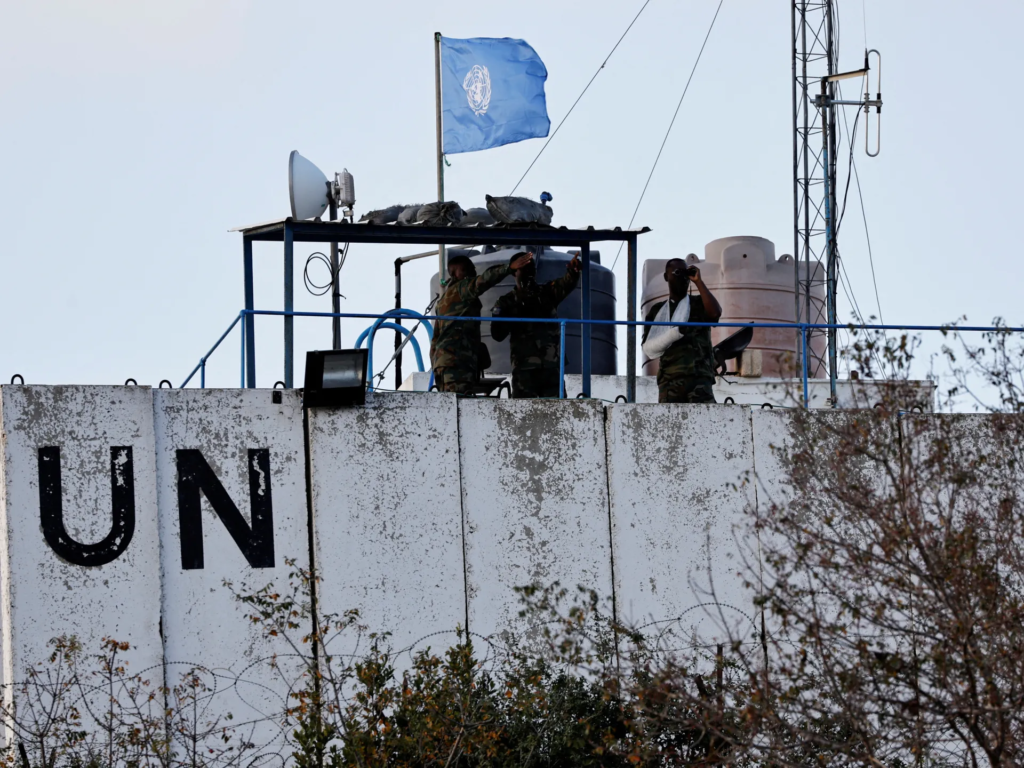Fire at UN peacekeepers in Lebanon has sparked significant concern, particularly as tensions escalate between Israel and Hezbollah. The recent incident, where Israeli forces fired on UNIFIL (United Nations Interim Force in Lebanon) headquarters and positions, injuring two peacekeepers, has drawn attention to the fragility of the region’s security.
This development adds a troubling layer to the ongoing conflict in southern Lebanon, where Israel is intensifying its operations against Hezbollah, a militant group with strong ties to Iran.
The attack on UN peacekeepers, who have been stationed in Lebanon to monitor the ceasefire and prevent hostilities, has raised alarms at the highest levels of the United Nations and among various international governments.
The targeted attacks on UN positions not only threaten the safety of peacekeepers but also signal a broader disregard for international law. This blog delves into the details of the incident, its broader implications, and the international response to these escalating hostilities.
UNIFIL Peacekeepers Targeted in Southern Lebanon
The initial reports of Israeli forces firing on UN peacekeepers emerged from the town of Naqoura, a key area in southern Lebanon near the Israeli border. On Thursday, an Israeli tank reportedly fired its weapon at a guard tower located at the UNIFIL headquarters, leading to the injury of two peacekeepers.
Read : Hezbollah Says They Are Open to Ceasefire with Israel in Lebanon
According to UNIFIL, the tank fire caused the two peacekeepers to fall from the tower, leading to injuries that, while not serious, required hospitalization.
The UN expressed deep concern over the incident, stating that these attacks on peacekeepers violate international humanitarian law and UN Security Council Resolution 1701, which was established to maintain peace in the region.
Resolution 1701, adopted in 2006 following the war between Israel and Hezbollah, mandates the presence of UNIFIL in southern Lebanon to oversee the cessation of hostilities and assist the Lebanese government in restoring its authority in the area.
In a series of attacks on UNIFIL positions, Israeli forces also targeted a UN post in the village of Labbouneh, hitting the entrance to a bunker where peacekeepers were sheltering. Vehicles and communication systems were damaged in this attack, further hampering UN operations.
The Israeli military reportedly disabled the surveillance cameras at the UN post, raising concerns about deliberate attempts to undermine the peacekeeping mission.
While no casualties were reported in these incidents, the attacks represent a significant escalation in the conflict and mark a dangerous shift in Israel’s military operations.
Targeting UN peacekeepers, who are neutral actors working to ensure regional stability, threatens the very foundation of the international efforts to maintain peace in southern Lebanon.
International Reactions and Calls for Accountability
The international community has reacted swiftly and decisively to the attacks on UNIFIL. Andrea Tenenti, spokesperson for UNIFIL, labeled the Israeli actions as “very serious” and highlighted that targeting peacekeepers is a blatant violation of international law.

Tenenti stated that UNIFIL was in discussions with Israeli authorities to understand the reasons behind the attacks, but he emphasized that any intentional targeting of UN personnel constitutes a grave offense.
Italy’s defense minister, Guido Crosetto, expressed his outrage at the incident, calling it “intolerable” and underscoring that it was not an accidental act. Crosetto summoned Israel’s ambassador and protested to Israel’s defense minister, signaling the seriousness of the situation.
Italy, a significant contributor to the UNIFIL mission, has about 1,000 troops stationed in Lebanon and views any attack on its peacekeepers as unacceptable.
Similarly, France, which also has a sizable contingent in UNIFIL, demanded explanations from Israel. The French foreign ministry condemned the attacks and called for a thorough investigation, emphasizing that the safety of peacekeepers must be ensured by all parties involved in the conflict.
These international reactions reflect the broader concern that the conflict between Israel and Hezbollah could spiral out of control, with potential repercussions for regional stability. The United Nations has repeatedly called for a ceasefire in the area, particularly since the hostilities between Israel and Hezbollah intensified in late September 2024.
UNIFIL has stressed the importance of maintaining the safety of its personnel as they carry out their mission, warning that any further attacks could severely compromise their ability to operate in southern Lebanon.
The situation is particularly delicate, as UNIFIL plays a crucial role in preventing an all-out war between Israel and Hezbollah. The peacekeepers’ presence serves as a buffer between the two sides, and any compromise in their safety or ability to operate could lead to an escalation of violence in the region.
Broader Implications for the Israel-Hezbollah Conflict
The recent attacks on UN peacekeepers come amid an intensification of Israeli military operations against Hezbollah in Lebanon. Hezbollah, an Iranian-backed militant group, has a strong presence in southern Lebanon and has been engaged in sporadic clashes with Israeli forces for decades.
The group, which is designated as a terrorist organization by several countries, including the United States and Israel, holds significant political and military influence in Lebanon.
Since the outbreak of hostilities in September 2024, Israel has been carrying out a broad offensive against Hezbollah positions, claiming that the group is planning attacks against Israeli targets.
Hezbollah, in turn, has launched missile attacks against Israeli forces, leading to a cycle of retaliation that has caused widespread concern about the potential for a larger conflict.
The fact that Israeli forces have now targeted UN peacekeepers raises critical questions about the direction of the conflict. UNIFIL, established in 1978, has been a crucial player in maintaining relative calm along the Israel-Lebanon border, especially after the 2006 war.
The peacekeeping mission, which includes troops from several countries, is tasked with monitoring the ceasefire between Israel and Hezbollah and ensuring that both parties respect the Blue Line, the UN-demarcated border between Israel and Lebanon.
The deliberate targeting of UN positions by Israeli forces suggests that the military is adopting a more aggressive posture, possibly in response to growing Hezbollah threats.
Hezbollah, for its part, has claimed responsibility for several attacks on Israeli troops, including the use of guided missiles to target an Israeli tank near Ras Naqoura, the same area where UNIFIL operates.

The attacks on UNIFIL not only complicate the already fraught dynamics between Israel and Hezbollah but also risk drawing the international community deeper into the conflict. With several countries contributing troops to UNIFIL, any further escalation that puts peacekeepers in harm’s way could lead to a broader international crisis.
Countries like Italy and France, which have large contingents in Lebanon, are already expressing frustration with Israel’s actions, and any further provocations could lead to diplomatic tensions.
As the conflict between Israel and Hezbollah intensifies, the role of UNIFIL becomes even more crucial in preventing an all-out war. However, the recent attacks on peacekeepers raise serious concerns about the viability of the UN mission in southern Lebanon.
If Israeli forces continue to target UN positions, it could lead to a situation where the safety of peacekeepers is compromised, and their ability to carry out their mission is severely hindered.
The broader implications of this development are worrying. The Israel-Hezbollah conflict has the potential to destabilize not just Lebanon but the entire Middle East.
The presence of international peacekeepers has long been a stabilizing factor, but if these forces are no longer able to operate safely, the risk of a wider regional war increases.
The international community must act swiftly to hold those responsible for the attacks on UNIFIL accountable and to ensure that the safety of peacekeepers is guaranteed.
Diplomatic efforts to de-escalate the conflict must be prioritized, and both Israel and Hezbollah must be reminded of their obligations under international law to respect the neutrality of peacekeeping forces.
The situation remains fluid, and it is essential for all parties involved to exercise restraint and to work towards a peaceful resolution.
The attacks on UN peacekeepers serve as a stark reminder of the dangers that continue to plague southern Lebanon, and the need for a renewed commitment to peace in the region is more urgent than ever.

